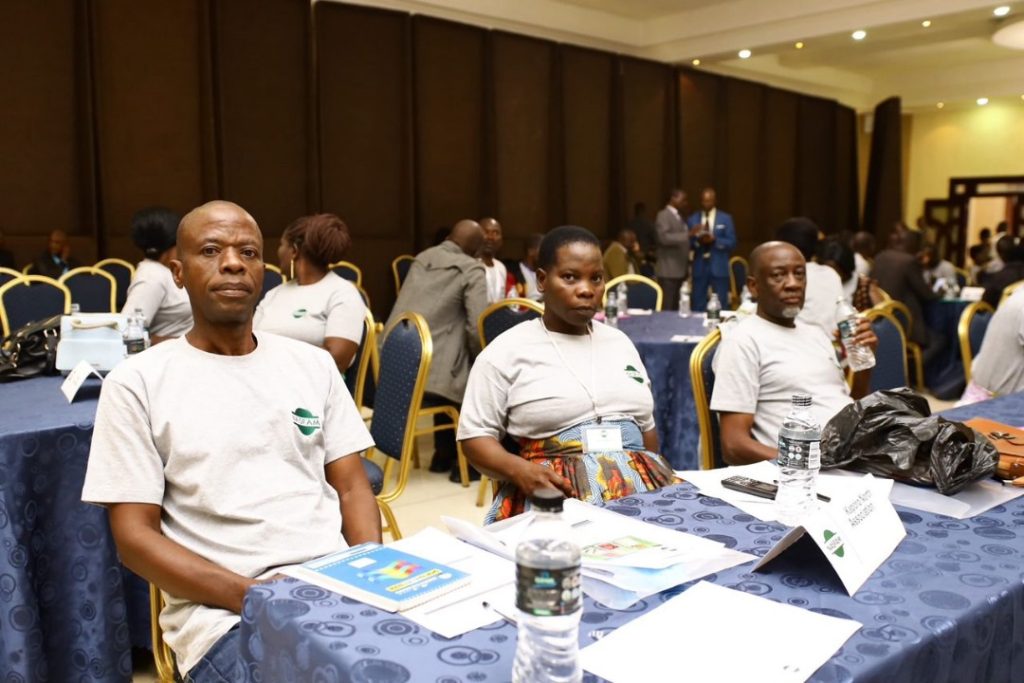Minister of Trade and Industry, Sosten Gwengwe, has commended the National Smallholder Farmers’ Association of Malawi (NASFAM) for championing and promoting value addition initiatives in the agriculture sector.
Gwengwe said the value addition initiatives that NASFAM has undertaken have helped the government to achieve increased income for smallholder farmers, creating employment, improving food safety and security, nutrition benefits and greater consumer confidence.
The minister was speaking in Lilongwe when he officially opened the seventh Annual General Meeting (AGM) for the organization. The AGM drew member farmers from all associations affiliated to NASFAM across the country and was held under the theme, “Improving Smallholder Farmers’ Market Access through Value Addition.”

The theme aligns with the Malawi 2063 pillar on Agricultural Productivity and Commercialization agenda, which is being championed by President Dr. Lazarus McCarthy Chakwera.
Gwengwe said his ministry will continue providing a conducive environment to ensure that smallholder farmers in the country, including NASFAM members, are able to trade and get maximum benefit from their hard work.
“Considering that trade is a powerful engine for economic growth and poverty reduction, we need more farmer organizations like NASFAM to mobilize and organize farmers, build a resilient producer base ready to engage in value addition, and address market challenges. These organizations are the backbone of agricultural development in Malawi, providing platforms for farmers to collaborate, access essential resources, and improve their agricultural practices,” said the minister.
According to Gwengwe, the contributions of NASFAM to the agriculture sector significantly complement government efforts, advancing the socio-economic development of the farmers and the sector at large.
He acknowledged that farmer organizations are pivotal in enhancing agricultural productivity and commercialization.
“Malawi 2063 emphasizes the transformation from subsistence to commercial agriculture, aiming for increased productivity and profitability. NASFAM is actively realizing this vision with remarkable success. By providing farmers with access to quality inputs, modern farming technologies, and comprehensive extension services, NASFAM enables farmers to produce more and become competitive on both the local and international markets.
“This aligns perfectly with our National Trade Policy, which underscores Government’s commitment to make trade a tool for sustainable socio-economic development and poverty reduction. Enabling our farmers to produce more and sell their products competitively will enhance improved livelihoods and will contribute to economic stability, which is vital for our national development,” said Gwenge.
Speaking earlier, NASFAM Board Chairperson Brian Jere lamented the influx of unscrupulous vendors roaming around in the communities, buying farm produce at very low prices particularly in very remote areas where farmers find it hard to reach profitable markets.
Jere also complained of unfair competition on the local market from smuggled goods, which he said makes it difficult for them to sell their produce and products.
“Smuggled goods are cheaper because they do not pay taxes. This makes Malawian smallholder farmers lose out on their investments because such smuggled goods reduce demand for our products. In addition to that, lack of quality consciousness by some traders has made it difficult to enforce quality standards. They buy anything presented to them, making it difficult to enforce quality standards, a thing that has made Malawi lose some profitable markets internationally,” he said.
Nonetheless, Jere implored member farmers to embrace collective marketing to leverage on collective transportation to better bargain for better prices.

In her remarks, NASFAM Chief Executive Officer Dr. Betty Chinyamunyamu highlighted some of the achievements the association made during the previous year.
Chinyamunyamu said, among others, that NASFAM made commendable strides in improving market access for smallholder farmers across various value chains, including rice, groundnuts, maize, soya, and chilli.
She said overall, commodities worth MK 3.7 billion were traded through the NASFAM system, surpassing the annual target of MK 2 billion by 83 percent.
“After five successive years of NASCOMEX (a major off taker of commodities produced by smallholder farmers) registering net losses, its financial performance took a landmark turning point during the year, with the company returning to overall profitability. NASCOMEX’s return to profitability is a step in the right direction to achieving one of the three key results of the project: financial sustainability,” she said.
Chinyamunyamu also disclosed that NASCOMEX secured a contract to supply Corn-Soya Blend (CSB) to Mary’s meals- a leading school meals provider, which led to the increase in the demand for maize and soya from members.